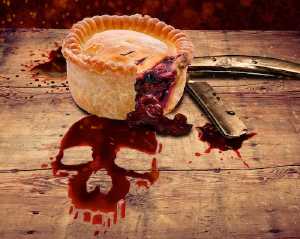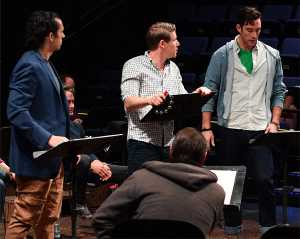Important deadlines and dates
Dates for 2022 will be posted soon.
How to Compete
To compete in the competition, follow these steps:
- Assemble your competition team
Decide what events your school wants to compete in. Decide which students will be competing in which events, and if you will be participating at Cedar City or virtually (or both!). If you participate virtually, you will be in the Ipswich Division. - Complete the Intent to Participate form
Please submit this by August 1. This form will help us better prepare for the competition and will inform us as to which division your school should be in. - Register your team at competition.bard.org
You can make changes to your registration any time while registration is open. After September 15, 2021, any changes are susceptible to a $50 fee and must be made by emailing Kyrsten Harper at educationprograms@bard.org. No changes can be made after September 17, 2021. - Pay the registration fee
An invoice will be sent to each school by September 22, 2021. Payment can be made by mailing in a check or paying with a credit card over the phone (435-586-7878). Please do not try to pay for the competition until you have received your invoice. - Record all acting monologue, acting duo/trio scenes, and all Ipswich competition pieces
See information below on criteria for recording pieces. - Submit all acting monologue, acting duo/trio scenes, and all Ipswich competition pieces
See information below about how to submit your competition pieces. These must be submitted by September 18, 2021. - Join us for the competition in Cedar City!
September 30–October 2. For the full calendar of events, please refer to the schedule available at bard.org/competition.
Frequently Asked Questions
- What are the dates of the competition?
September 29–October 1, 2022. Find the schedule on bard.org/competition - Where is the competition?
The competition is hosted by Southern Utah University and the Utah Shakespeare Festival in Cedar City, Utah. A virtual competition, the Ipswich division, is also offered. - How do we register?
An intent to participate form should be submitted by August 1, 2021. Registration must be submitted online at competition.bard.org no later than 11:59 p.m. Wednesday, September 15, 2021. Any change of registration after September 15, 2021 is subject to a $50 fee per change. No changes of entries will be allowed after September 17, 2021. - How much does it cost to compete?
The base registration fee for each participating team is $200. Each additional competitive category (acting, dance, music, tech) is $75. If schools participate in both a regular division and the Ipswich division, the fee is $200 for each.
One category: $200
Two categories: $275
Three categories: $350
All categories: $425
Because of a grant from the Utah State Office of Education (Professional Outreach Program in the Schools) registration fees are waived for all public and charter schools in Utah. If Utah schools participate in a regular division and Ipswich, only one of their teams is eligible for this fee waiver.
The Ye Olde Improv Competition is separate and has its own registration process and fees. - What Southern Utah University performances will take place during the competition?
TBD. Call 435-586-7872 for the SUU Ticket Office. - What Utah Shakespeare Festival performances will take place during the competition?
The Tempest, Clue, The Sound of Music, and Thurgood. - Is there a discount for group tickets?
Yes. Anyone associated with the Shakespeare Competition will get 50 percent off all Utah Shakespeare Festival performances. Call the Ticket Office for more information: 1-800-PLAYTIX. - What are the time limits for competition pieces?
Mono (one person): two to four minutes
Duo/Trio (two or three people): three to five minutes=
Ensemble (no less than four people): six to ten minutes
Dance Duo/Trio (two or three people): three to six minutes
Dance Ensemble (no less than four people): three to six minutes
Music Minstrel: one piece, up to six minutes
Music Madrigal: one to three pieces, up to ten minutes - How many students can compete?
Acting Monologues: Three participants
Acting Duo/Trio Scenes: Two groups of two to three participants
Acting Ensemble Scenes: One scene of four or more participants
Dance Duo/Trio Dance: One group of two to three participants
Dance Ensemble Dance: One group of four or more participants
Music Minstrel: Two groups of one to ten participants
Music Madrigal: Two groups of six or more participants
Tech Olympics: One team of one to eight participants
Portfolio Competition: Three participants
There is no limit to the total size of the group. - Can students compete in multiple events?
Yes! There may be scheduling conflicts if students compete in multiple categories (i.e. acting and dance), but schools can let us know ahead of time of the potential conflict on the Schedule Conflict Form, and we will be sure to avoid overlap. If students compete in multiple events in the same category (i.e. acting monologues and acting duo/trio scenes, or music madrigal and music minstrel), there will not be any conflicts. - Can a school compete in both the in-person competition and the Ipswich competition?
Yes! Schools can participate in just the in-person competition, just the Ipswich competition, or both the in-person competition and the Ipswich competition. If students compete in both competitions with an acting monologue, acting duo/trio scene, or dance duo/trio, they cannot compete with the same piece (i.e. a student can compete with a monologue for both in-person and Ipswich, but they must be two separate monologues). - Do I need props and costumes?
Use of props and costumes is optional. Scenes will not be judged based on costumes, make-up, or props. - Can my team rehearse on the stage before the performance?
No. Unfortunately because of limited space and the large number of students we cannot accommodate rehearsal space or time. To create a level playing field, schools cannot rehearse in the space even if the school finds the space empty and not being used. - What time and where can I check-in at the event?
Check-in will be completed online. More information will be provided before the competition begins. - When should I book my hotel?
ASAP! Once Cedar City hotels have been booked, other areas to consider are Parowan, Hurricane, Brian Head, Beaver, and St. George. - How can I get more information?
Visit www.bard.org/competition for more information about the competition.
Divisions
Any school, public or private is eligible to participate in the competition. No student may compete for more than one school or group.
Competitors at the Shakespeare Competition are divided into six divisions: Buckingham, Oxford, Cambridge, Westminster, Stratford, and Essex. A seventh division, Ipswich, allows for students to participate virtually, and students from any of the other six divisions can also compete in Ipswich.
Buckingham, Oxford, Cambridge: The public high school divisions are determined by school enrollment and state activities association alignment. School enrollment of the current year only includes grades ten to twelve. Schools should not count ninth graders in their enrollment total, but are welcomed and encouraged to have ninth graders compete as part of their team. When registration begins, the largest third of schools will be assigned to the Buckingham Division, the next third to Oxford, and the smallest third to Cambridge.
Westminster: The Westminster Division will primarily be composed of charter schools. Because of their state activities association alignment, some charter schools may be placed in Buckingham, Oxford, or Cambridge.
Stratford: The Stratford Division includes any junior high school or middle school, regardless of school enrollment. Eighth or ninth graders may participate in the Stratford Division if they are enrolled in that school. They may not compete for a high school if they’re not enrolled at that high school.
Schools with enrollment that includes high and junior high grades should register as two separate schools, one in Stratford and the other in the appropriate high school division.
Essex: The Essex Division includes schools or groups that are not members of state middle or high school associations. This includes private schools without a state activities association, homeschool groups, alternative schools, and after-school clubs.
Ipswich: The Ipswich Division is virtual and allows for schools and students to participate remotely. At this time, all schools participating in Ipswich will compete against each other; there is no separation between public, private, charter, and middle schools.
Workshops
Acting, dance, music, and tech workshops will be offered for the students and coaches. These are taught by professional artists and technicians. Students and coaches are encouraged, but not required, to attend.
A workshop schedule will be sent to participating schools one week prior to the competition.
Competition Scoring
All acting, dance, and music performances will receive a rating score and a rank by three different adjudicators.
Rating score: The total points given to a piece, as identified by the judge’s sheet.
Rank: First place, second place, third place, etc.
Final placings are tabulated based on rankings. If there is a tie for any of the first three places, rating scores will be used to break the tie.
Any performance going over or under time will be unable to receive a first, second, or third award. Any acting piece’s final rating score will also be dropped 60 rating points (out of the total 300) for the final acting sweepstakes tabulation.
Rating scores are determined using the following scale for each of the different criteria on the judge’s sheet. All of the categories are added up to give a rating score up to 100 points for acting and dance, or 70 points for music. The three rating scores from each judge are added together to give a final rating score up to 300 points for acting and dance, and 70. A well-rehearsed and prepared competition piece should expect to receive a score of 50 from each judge. Anything above a 50 is exceeding the expectation.
Fair: The competitor has not displayed any mastery of the particular skill. One point
Emerging: The competitor has shown a beginning level of understanding and application of the particular skill. Three points.
Standard: The competitor has displayed a good understanding and application of the particular skill. They have met the basic expectation, but there is room for growth in this area. Five points.
Above Average: The competitor has exceeded the basic expectation and has displayed an excellent understanding and application of the particular skill. There is little room for growth in this area. Seven points.
Superior: The competitor has mastered the particular skill. There is little to no room for growth in this area. Nine points.
Acting Competition
Acting Materials and Events
The Shakespeare Competition is limited to text from William Shakespeare’s plays, sonnets, and poems. All words spoken or sung by performers must be Shakespearean text. In each division a full contingency consists of the following: three monologues, two duo/trio scenes, and one ensemble scene. The acting sweepstakes score is calculated based on these three events.
Monologues: A monologue is one person portraying the role of one person. A monologue may also consist of an interpretation of a sonnet or one of Shakespeare’s poems. The time limit is two to four minutes, with a fifteen-second allowance. Timing begins after the introduction. Any participant going more than fifteen seconds under time or over time will be unable to receive a first, second, or third place award. Their final rating points will also be dropped sixty points.
Duo/Trio Scenes: A duo/trio is a scene between two or three characters with an emphasis on interpretation and relationships. Time limit is three to five minutes, with a fifteen-second allowance. Timing begins after the introduction. Any scene going more than fifteen seconds under time or over time will be unable to receive a first, second, or third place award. Their final rating points will also be dropped sixty points.
Ensemble Scene: The ensemble scene will consist of no less than four participants. Scenes may be from any of Shakespeare’s plays with an emphasis on interpretation and ensemble work. Time limit for scenes is six to ten minutes. Timing begins after the introduction. Any scene thirty seconds under time or over time will be unable to receive a first, second, or third place award. Their final rating points will also be dropped sixty points. Scenes that violate the participant limit of no less than four participants will be disqualified.
Preliminary and Final Round—Monologue and Duo/Trio Scenes
The Shakespeare Competition will be hosting a finals round for the acting monologue and acting duo/trio scene categories. All acting monologues and duo/trio scenes will first be adjudicated virtually, and then the top twelve to twenty pieces in each division will compete against each other at the Shakespeare Competition in Cedar City. Pieces will be selected to compete in the finals round if they have the best overall score, the best score with their lowest score dropped, or the best overall rating.
All pieces must be submitted by the end of the day September 18, 2021 using the Shakespeare Competition Submission form. The finals rounds will be announced on September 24, 2021.
Criteria for video recording
In an effort to create uniformity and a level playing field for all schools, the following guidelines must be followed for all competition pieces.
- The recording must be a single, continuous, unedited shot from a single vantage point. No zooming in, panning, or other camera movement is permitted. Any videos that contain camera movement or editing will not be able to compete.
- No body mics or boom mics should be used. No audio can be added to the video after filming. All audio in the video should be picked up from the camera’s internal microphone.
- The beginning of the recording should include an introduction by one of the participants which should include ONLY the participant(s) number, the title of the piece, and the act, scene, and character(s). No text slides, subtitles, etc. are necessary and should not be added to the video.
- If the piece is performed on a stage, the only stage lighting that should be used is a general wash. No specialized lighting or light cues should be incorporated.
- The piece should be performed as it would be if it made it to the finals round.
In other words, imagine you are competing at the competition itself and have recorded your competition piece with a phone or camera.
Refer to the “Video Submission” section on information on how to submit videos.
Regulations
A participant should not use a cutting in monologues or duo/trio scenes from a play or be involved in an ensemble scene from which they have already participated in previously at the Shakespeare Competition. Material performed by a participating school in the last three years, should not be repeated by that school. It is encouraged that schools use a variety of Shakespeare’s works from year to year to expose students to different titles.
Use of props, costumes, make-up, and sound is optional. All audio equipment must be provided by the participating school, and electrical power is not guaranteed in every performance space. The scoring of the scenes is based on the quality of the scene, and adjudicators do not consider costumes, make-up, and props when scoring pieces.
Evaluation Criteria
Scenes will be evaluated based on voice (diction and projection), body (physicalization, blocking, and movement), character (objectives/motivation, tactics/actions, presence, and communication), and text (language, understanding, rhythm, and tempo). Specific ballots can be found on bard.org/competition.
Scholarships and Awards
The first place senior of a high school in the monologues and the duo/trio scenes will be awarded scholarships to Southern Utah University.
A best performance award, the Larry Lott Acting Award, will be given in the ensemble scene, accompanied by a $1,000 scholarship to winners who are graduating seniors from sanctioned high schools. The awards for best performance in the ensemble scene will be chosen by the panel of adjudicators.
Awards for first, second, and third place will be given in monologues, duo/trio scenes, and ensemble scenes in each division. Additionally, a first, second, and third place sweepstakes award will be given in each division. Sweepstakes will be calculated by adding the rating scores of each piece. Duo/trio scenes and ensemble scenes are weighted so that each category is worth 900 points. The final rounds for monologue and duo/trio are not added into the sweepstakes score. The acting sweepstakes score is out of a total 2,700 points.
Monologues: 3 monologues x 3 judges x 100 points = 900 points
Duo/Trio: 2 scenes x 3 judges x 100 points x 1.5 = 900 points
Ensemble: 1 scene x 3 judges x 100 points x 3 = 900 points
Dance Competition
The dance competition is limited to choreography inspired by literary text, sonnets, or poems of William Shakespeare. It is required that each dance number have a brief paragraph description of the concept, which is provided during registration and recited during the verbal introduction. Oral critiques are given by the adjudicators, and dance workshops are offered for teachers and students in technique and composition.
Evaluation Criteria
- The choreography must be motivated by and integral to a sonnet, poem, line, or scene written by William Shakespeare.
- The verbal introduction should include the title of the piece, as well as a brief description of the concept, and which line, character, or scene the dance is based on. This is true for Ipswich submissions as well.
- Time will begin after the introduction.
- The dance can be of any genre.
- Schools may enter a duo/trio dance and/or an ensemble piece.
- The evaluation will be based on the choreography as it is showcased through a quality performance, not only the skill of performers.
- Music is to enhance the choreography. Highly popularized music is discouraged, unless part of a strong choreographic choice and addressed in the description.
- Any recorded music used as accompaniment, must be able to play through a standard 3.5 mm headphone jack.
- The dance must provide a theatrical/imaginative experience.
- Any piece going more than fifteen seconds under time or over time will have their overall score reduced thirty points.
- Awards will be given in each division.
Scholarship Auditions
Scholarship auditions will be held Saturday morning. Sign ups will be available on bard.org/competition prior to the competition.
Music Competition
The purpose of the Music Competition is to encourage students to explore and develop a relationship with the music of the Renaissance. Students are encouraged to utilize creative combinations of instruments. The use of period instruments is not required.
At this time there will be no divisions, with the exception of Ipswich, in this competition. There are two categories of competition: Minstrel and Madrigal.
Minstrel
- Two entries per school in any combination of small and large groups. A school may bring two small groups, a small and a large group, or two large groups.
- Repertoire: Please reference the Music Repertoire List at bard.org/competition and sources to purchase music. NOTE: Repertoire of the period with any instrument combinations is desired. Creativity in combinations is encouraged.
- LIVE ACCOMPANIMENT ONLY; all performers must be STUDENTS ONLY. This includes accompanists.
- Performance includes one piece up to six minutes. Groups will have fifteen-minute slots including onstage comments from adjudicators.
- It is helpful to the adjudication if schools provide at least one copy of the music.
- Minstrels will be divided and judged in two groups—small and large.
–—Small Groups: A solo or small ensemble of one to five individual parts. Groups may be a mixture of voice and instrument, all instruments, all voices, or unaccompanied/accompanied solo.
–—Large Groups: A small ensemble of six to ten people; Groups may be a mixture of voice and instrument, all instruments or all voices.
Madrigal
- Two entries per school in any combination of small and large groups. A school may bring two small groups, a small and a large group, or two large groups.
- Repertoire: Any madrigal up to the year 1650.
- LIVE ACCOMPANIMENT ONLY
- Performances include one to three pieces up to ten minutes. Groups will have fifteen-minute slots including onstage comments from adjudicators.
- It is helpful to the adjudication if schools provide at least one copy of music.
- Madrigals will be divided and judged in two groups—small and large.
—Small Groups: A choral group of six to sixteen people without multiple instruments.
—Large Groups: A choral group with a minimum of seventeen people.
Workshops, Concert, and Scholarship Auditions
Various workshops, an SUU Choir Concert, and an SUU scholarship audition will all take place during the competition. Refer to the schedule and bard.org/competition for more details.
Tech Competition
Tech Olympics
One team of one to eight members per school is allowed. A team member completes one or more of the following events: audio, lighting, props, carpentry, costumes, stage management, hair and make-up, and rigging. Specific tasks for each of these categories is not revealed until the team competes. Awards are given to individual event winners as well as overall team winners, based on timing, execution, and accuracy.
Portfolio Competition
Students can enter their technical and/or design portfolios for review by professionals at the competition and receive a written and verbal evaluation. More specific information regarding the Portfolio Competition is available at bard.org/competition.
- Each school is allowed three entries.
- Students will submit a PDF version of their portfolio to the Tech Competition Associate who will upload them to a website. Students work will be displayed digitally throughout the competition as well as during their interviews.
- The PDFs must be a portfolio of work showing the student’s design/technical skills. It should include a resume, and any pertinent draftings, renderings, models, photos, sketches, and research designs. Please include high resolution images of three-dimensional items (i.e. costumes, models, etc.) including multiple angles as there will be no physical displays or spaces available.
- By entering the Portfolio Presentation Competition students acknowledge that their portfolios may be used during a Portfolio Adjudication and Workshop.
- Students will sign up for a time to present their portfolio to the panel of judges. This presentation does not affect the portfolio’s score.
- The first place winner will receive a scholarship to SUU if the winner is a high school senior.
Portfolio Evaluation
A panel of judges will review the portfolio and judge them based on ease of comprehension, presentation, and overall effect. The judges will provide written and verbal critiques to each participating student.
The panel of judges will consult and pick the top portfolios. The best overall portfolio will be awarded a scholarship.
Ipswich Division
The Ipswich division is a virtual competition. All competition pieces will be recorded and submitted online. Refer to the “Video Submission” section on how to submit competition pieces.
Competition events include acting monologues, acting duo/trio scenes, acting ensemble scenes, dance duo/trio scenes, dance ensemble scenes, music minstrel, music madrigal, and technical design. Pieces will be scored and ranked by three different judges. The rules and regulations (time limits, participant limits, etc.) from the regular divisions all apply to the Ipswich division.
The use of editing and cinematography is encouraged and will be included on the judge’s sheet.
Schools can participate in just the Ipswich Division, or they can compete in both their regular division and the Ipswich division. If schools compete in both, they must register as two different teams on competition.bard.org. Individual students may compete in both divisions. Some competition events allow the use of the same material in the regular division as the school used in the Ipswich division.
Acting Monologues, Acting Duo/Trio Scenes, Dance Duo/Trio: Students cannot submit the same material they are using for their regular division.
Acting Ensemble Scene, Dance Ensemble Scene, and Music: Schools can use the same material they are using in the regular division, with the expectation that the staging and filming of the piece would be modified for an Ipswich submission.
Tech Portfolios: Due to limited resources this year, we will not be offering any tech adjudications for the Ipswich Division.
The top ranking Ipswich pieces in each event will be broadcast on site throughout the Shakespeare Competition. These pieces will also be made available for participating schools to watch remotely.
There will be a separate awards ceremony for the Ipswich division on Friday evening of the Shakespeare Competition. The announcement of the awards will also be broadcast online. Schools participating in Ipswich do not need to come to Cedar City, although they are welcome to do so.
Video Submissions
Schools participating in the acting monologue, acting duo/trio scene, or any of the Ipswich competitions, must submit all of their videos or files using the Shakespeare Competition Submission Form. Submissions must be received by the end of the day, September 18, 2021.
All videos and files must be accessible by a single hyperlink. In order to create a hyperlink, you may do any of the following options:
Google Drive
- Upload your video/file to a google drive.
- Right-click the video/file and select “Get shareable link.”
- Make sure the option “Anyone with the link” is selected.
- Copy the link provided.
YouTube
- Create or log-in to a YouTube account.
- Upload your video to YouTube using the “Create” button.
- Select the video file.
- Complete the prompted information in Steps 1 and 2 (title, etc.) as you like. There are no specifications about what these need to be.
- Step 3- Visibility. It is up to you whether or not the video is “public” or “unlisted,” but it should not be “private.”
- Copy the link provided.
- Create a post.
- Add your video to the post.
- Under your name, make sure the privacy option says “Public.”
- Post your video to your Facebook.
- Click on the video, and copy the link in the address bar.
If there is another option you are more comfortable with (vimeo, etc.), you are welcome to use a different platform as long as you can submit a link to your video.
IMPORTANT: Once you have your link, test it by doing the following:
- With your browser (Chrome, Firefox, Internet Explorer, etc.) open, click “File.”
- Select “New Incognito Window” or “New Private Window.” This allows you to view your video as if you were one of the adjudicators.
- Paste your link into the address bar and make sure it works
Production Showcase
The production showcase features selected performances from acting, dance, and music in four different venues. Each production showcase will feature a variety of performances from a variety of divisions. The production showcase occurs Saturday afternoon, and all invited performances will be notified beforehand. Judges identify work in each round they believe merits being a part of the production showcase, even if it hasn’t been ranked especially high. The tabulation room makes the final determination as to which selections are seen in each of the four venues. Schools choose which showcase they attend.
Hosts and Sponsors
The Utah Shakespeare Festival and the Southern Utah University College of Visual and Performing Arts host this event. It is sanctioned by the Utah High School Activities Association.










